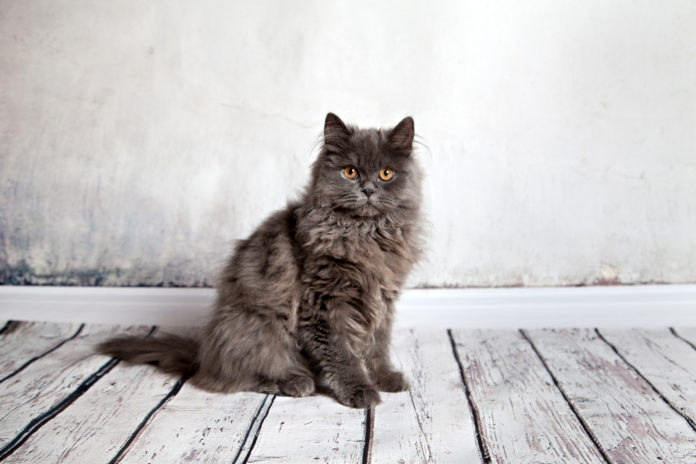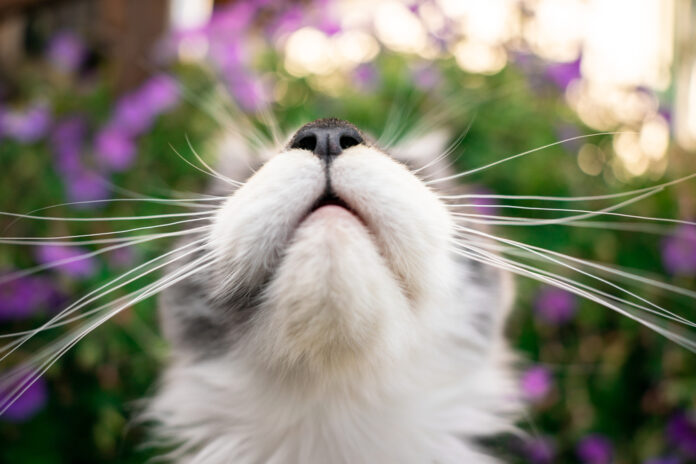6 ways to keep your senior cat healthy and happy

If your feline is ten or older, he’s officially a senior cat! Take these six steps to ensure his golden years are long and healthy.
By the time cats reach the age of ten, they’re officially considered senior citizens. Fortunately, many kitties are living into their late teens and early 20s, so with proper care, a senior cat in good health at ten can easily live another eight, ten or even 12 years. If your own cat is entering his senior years, it’s great time to take these six steps to ensure the second half of his life is as healthy and happy as the first.
1. Feed your senior cat like a true carnivore
Aging cats need more animal protein in their diets than their younger counterparts, and the quality of that protein is very important. The more digestible and easily-assimilated the protein is, and the higher the moisture content of the food, the easier it will be for aging organs to process.
Healthy older cats do best when fed a nutritionally-balanced, antioxidant-rich, species-appropriate diet that includes Omega-3 essential fats. Since moisture is a cat’s best friend, be sure to encourage hydration by offering your kitty a variety of water bowls around the house, or a pet drinking fountain, in addition to minimizing or (preferably) eliminating commercial dry food.
2. Provide appropriate supplementation
- SAMe (S-adenosylmethionine) is a safe and effective way to stall mental decline, improve mobility, and assist in liver detoxification in your aging cat.
- Medium-chain triglycerides (MCTs) are safe for cats and can improve brain energy metabolism and decrease the amyloid protein buildup that results in brain lesions in older animals. Coconut oil is a rich source of MCTs and may also reduce hairball issues.
- Periodic detoxification with the herbs milk thistle and dandelion can be very beneficial. Chlorophyll, chlorella or spirulina can also be offered in supplement form to help support your cat’s organs of detoxification.
3. Take steps to keep his aging body comfortable
Keep your cat at his ideal body weight and ensure adequate physical activity to help control arthritis and degenerative joint disease as he ages. Chiropractic adjustments and acupuncture can also be very helpful in keeping him mobile in his golden years.
A wide range of supplements can be added to your cat’s diet to help maintain healthy tendons, ligaments, joints and cartilage. These include:
- Glucosamine sulfate with MSM and eggshell membrane
- Omega-3 fats (krill oil)
- Ubiquinol
- O.D. (superoxide dismutase)
- Natural anti-inflammatory formulas, including herbs such as boswellia along with proteolytic enzymes
Also ensure your cat can get into and out of his litterbox easily. Remember that kitties are very adept at hiding arthritis and other aches and pains, which can limit their ability to climb into high-sided boxes, or those kept in bathtubs or up a flight of stairs.
Regular massage can help keep your cat’s aging muscles toned, and also improves circulation, encourages lymphatic drainage, and eases joint stiffness.
4. Encourage your senior cat to remain physically active and mentally stimulated
Keep your cat’s body and mind active with regular exercise appropriate for his age and physical condition, and his mental stimulation (puzzles and food-dispensing toys that encourage hunting can be beneficial). Organic catnip or silver vine can be a very effective way to encourage your kitty to play.
Regular massage can help keep your cat’s aging muscles toned, and also improves circulation, encourages lymphatic drainage, and eases joint stiffness.
5. Minimize environmental stressors
Cats of all ages do best with a consistent daily routine, but older cats tend to get extra stressed when presented with anything new or different in their environments. In addition, your senior kitty may be dealing with some vision and hearing loss, reduced tolerance for cold weather, and mental confusion, all of which can create stress.
…older cats tend to get extra stressed when presented with anything new or different in their environments.
Senior cats can become cranky and easily irritated, so it’s important that all family members, including other animals, approach your kitty in a quiet non-aggressive manner.
Make a concerted effort to keep your cat comfy, secure and relaxed by maintaining a consistent daily routine and providing him with a quiet cozy hideaway (preferably without harsh lighting or EMFs) with comfy bedding and a favorite toy or two. Set aside time each day to hang out with him. If he tolerates being brushed or combed, work that into your daily interactions to help him stay well-groomed. Light brushing also stimulates your cat’s lymphatic system, which assists with detoxification.
6. Schedule twice-yearly veterinary visits
Once cats are in their senior years, their wellness and nutritional needs can require fine-tuning every four to six months. It’s very important to review your cat’s weight, muscle tone, joint range of motion, diet, supplement protocol and exercise habits at least a semi-annual basis.
During veterinary visits, be sure to mention any behavior changes you may have noticed in your cat, no matter how minor, as these can provide important clues about health problems that may be brewing under the surface. It’s also important to monitor your cat’s weight to ensure he isn’t becoming too heavy or too thin.
The senior animal wellness screen is an excellent tool for the early detection of changes in your cat’s health, so that treatment, including appropriate lifestyle changes, can begin immediately. As part of the checkup, your vet will perform a physical exam and blood test (including thyroid levels), a urine test and stool sample tests.
The results will provide a snapshot of how well your cat’s organs are functioning, and point to any potential problems. Regular wellness screens also allow your veterinarian to compare current test results with past results to check for changes that may need further investigation.
With the help and guidance of an integrative or holistic veterinarian, these six steps are simple to implement, and will go a long way to ensuring your senior kitty enjoys many more healthy and comfortable years with you.



